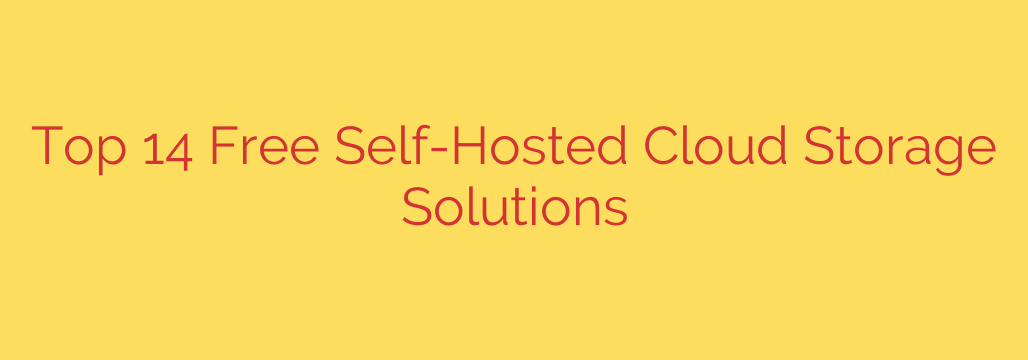
Regain Control of Your Digital Life: The Ultimate Guide to Self-Hosted Cloud Storage
Are you tired of rising subscription fees for cloud storage? Concerned about who has access to your personal photos, documents, and private data? In an age where digital privacy is more important than ever, relying on third-party services like Google Drive, Dropbox, or iCloud means handing over control of your most sensitive information. The solution is to build your own private cloud.
Self-hosting your cloud storage puts you in the driver’s seat. By running cloud software on your own hardware—whether it’s a dedicated server, a NAS (Network Attached Storage) device, or even a simple Raspberry Pi—you gain complete ownership of your data. This approach offers unparalleled privacy, security, and cost-effectiveness, allowing you to create a digital safe haven tailored to your exact needs.
Ready to take the first step toward digital sovereignty? Here are some of the best free and open-source self-hosted cloud storage solutions available today.
Nextcloud: The All-in-One Private Cloud Suite
Nextcloud is arguably the most popular and feature-rich self-hosted cloud solution on the market. It goes far beyond simple file storage, transforming your server into a complete productivity platform. Think of it as your own private Google Workspace or Microsoft 365.
- Core Features: Robust file sync and sharing, version control, and powerful mobile and desktop clients.
- Collaboration Tools: Includes integrated video and audio calls (Nextcloud Talk), calendar and contact management, and online office document editing through Collabora or ONLYOFFICE.
- Unmatched Extensibility: A massive app store allows you to add features like password managers, project management boards, RSS readers, and end-to-end encryption.
- Best for: Individuals, families, and businesses looking for a comprehensive, all-in-one solution that can replace multiple subscription services.
ownCloud: The Enterprise-Grade Standard
ownCloud is the project from which Nextcloud was born, and it remains a powerful and reliable choice, particularly for professional and enterprise environments. It focuses on providing a stable, secure, and highly polished file-sharing platform.
- Key Strengths: Exceptional security features, robust performance, and seamless integration with existing IT infrastructure.
- File Management: Offers granular sharing permissions, guest user access, and file locking to prevent conflicts in a team setting.
- Focus on Stability: Prioritizes long-term stability and reliability over cutting-edge features, making it a trusted choice for mission-critical data.
- Best for: Businesses, universities, and users who need a rock-solid, secure, and compliant file storage and sharing system.
Seafile: High-Performance File Syncing
If raw speed and efficiency are your top priorities, Seafile deserves your attention. It was built from the ground up for high-performance file syncing, especially for large files and massive datasets. Its unique data model organizes files into libraries, which can be synced and encrypted individually.
- Blazing-Fast Performance: Utilizes differential syncing, which means it only transfers the parts of a file that have changed, resulting in incredibly fast uploads and downloads.
- Reliability and Data Integrity: Features built-in file versioning and snapshotting for libraries, making it easy to recover previous versions of your data.
- Drive Client: The Seafile Drive client allows you to access all your files on-demand without syncing them to your local disk, saving valuable hard drive space.
- Best for: Creative professionals, researchers, and teams that work with large files (like videos, design assets, or scientific data) and need top-tier performance.
Syncthing: Decentralized and Direct File Synchronization
Syncthing takes a different approach. Instead of a central server model where all your devices sync to one location, it is a decentralized, peer-to-peer file synchronization tool. Your files are synced directly between your devices (computer, phone, server) without ever being stored on a third-party server.
- Ultimate Privacy: Since there is no central server, you are the only one who holds your data. All communication is encrypted from end to end.
- Simple and Focused: Syncthing does one thing and does it exceptionally well: keeping folders in sync across multiple devices.
- Resilient and Flexible: If one device is offline, others can still sync with each other. You can create complex network topologies to fit your exact needs.
- Best for: Users who primarily need to keep files synchronized across their personal devices and value maximum privacy and simplicity over web-based collaboration features.
FileRun: A Lightweight and Modern Web Interface
If you love the clean, fast interface of Google Drive but want to host it yourself, FileRun is an excellent option. It’s not open-source, but it offers a generous free license for personal use. FileRun focuses on providing a beautiful and intuitive user experience for file management.
- Familiar Interface: Its polished design makes it incredibly easy to use, with features like drag-and-drop uploads, photo galleries, and music and video streaming.
- Low Resource Usage: FileRun is remarkably lightweight and can run smoothly on low-power hardware like a Raspberry Pi.
- Powerful Features: Despite its simplicity, it includes robust metadata support, file labeling, and integrations with office suites like Collabora.
- Best for: Home users and individuals who want a self-hosted alternative to Google Photos and Drive with a modern, user-friendly interface.
Essential Security Tips for Your Private Cloud
Self-hosting gives you control, but that control comes with responsibility. Securing your private cloud is crucial to protecting your data.
- Use Strong, Unique Passwords: This is your first line of defense. Combine it with a password manager.
- Enable Two-Factor Authentication (2FA): This is non-negotiable. 2FA adds a critical layer of security that protects your account even if your password is stolen.
- Keep Your Software Updated: Regularly update your cloud software and the underlying server operating system to patch security vulnerabilities.
- Implement Automated Backups: Your self-hosted cloud is not a backup. You need a separate, automated backup solution (ideally off-site) in case of hardware failure, corruption, or a ransomware attack.
- Secure Your Connection with HTTPS: Use an SSL certificate (Let’s Encrypt provides them for free) to encrypt all traffic between your server and your devices.
Source: https://www.linuxlinks.com/best-free-open-source-self-hosted-cloud-storage-tools/








